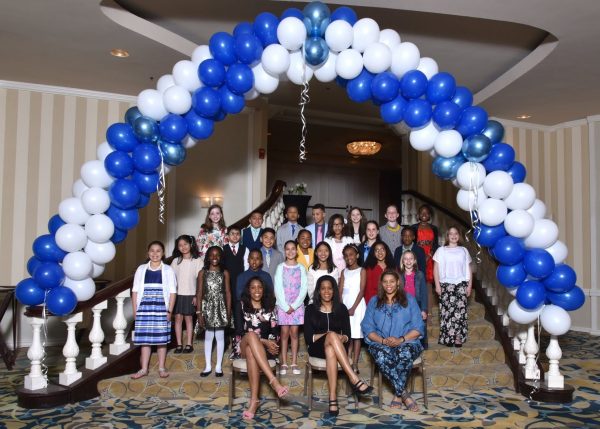ETHS students, alums pursue their passions with businesses
September 24, 2020
While a pandemic has been raging throughout our nation, ETHS students and alumni have put their energy into developing strong entrepreneurship skills.
So far, 2020 has seen hundreds of protests and rallies across the country. Recent events, such as the shooting of Jacob Blake and the murder of Breonna Taylor, have left people disgusted, furious and ready to make a change. In addition to the call for racial justice, COVID-19 has shown itself to be a worthy adversary to US citizens in its own right, with the current case count at 6.9 million as of Sept. 23 (The New York Times). With these significant threats in mind, both current students and ETHS alumni have used their businesses to support charities that address the issues facing the United States.
“We know the money we raise will be going to helping others,” junior Julia Granchalek says of Baking for BLM, a business she’s created with ETHS junior Jojo Wertheimer. The two donate 100 percent of profits made from selling their baked goods to Black Lives Matter Chicago.
Meanwhile, some students have decided to donate to a cause that hits a little closer to home. Sophomore Gillian Aaronson started the newest project from her umbrella business Do Good during the quarantine. Her project, Cookbooks for Corona, raised money for local hospitals to purchase personal protective equipment to aid in fighting the current pandemic.
¨I chose this cause because I’m at high risk, and so it affects my life a lot,” Aaronson says, reflecting on one of the key reasons she chose this cause.
While Aaronson’s actions boost health-related charities, some ETHS alumni support activist organizations.
ETHS alums Kennedy Freeman and Grayson Colbert use their businesses as a way to contribute to the fight for racial equality.
An 18-year-old artist, Freeman donates her profits to The Bail Project, an organization that helps fight racism in the United States criminal justice system. Freeman created Kkflee Art, where she makes t-shirts, prints, stickers, magnets and other commissions. So far, she’s donated $1,000.
“Buying from my company would be supporting a young Black female artist and contributing to an amazing cause,” Freeman says.
Grayson Colbert’s business, SOFTPRINTS, was created with the intention of supporting trans Black, Indigenous and people of color (BIPOC).
“I… had a week where I teamed up with 15 different artists who also donated a portion of their profits to a Black and trans individual in need,” Colbert, who identifies as trans and non-binary, says. Colbert has made an effort to emphasize the importance of fighting for Black and trans artists, especially during this time. Recently, they have raised $8,000 for those in need. They originally developed SOFTPRINTS back in 2015 but recently have seen an influx of business during the quarantine. Their main challenge isn’t finding customers but getting products to them. They note that the post office hasn’t been very accessible or reliable due to the pandemic. Aaronson and Granchalek agree that this has been an issue for them as well.
“Figuring out a way for people to pick up a cookbook is hard,” Aaronson says.
Additionally, both entrepreneurs also understand a second critical part of product handling: sanitization.
“During the whole process, I was quarantined and always socially distanced and wearing a mask, so I knew there was a low chance for me to get [COVID-19],” says Aaronson.
Colbert, meanwhile, went the extra mile in their approach to the virus and gets tested regularly. They are determined to keep everything as safe as possible for their customers.
Sophomores Zoe Parker and Violet Weston of Z&V Jewelry have a plan that includes a bit of waiting.
“We have the products themselves in their bags [or] boxes for 48 hours before pickup [or]mailing the orders to ensure the risk of infection will be reduced,” Parker states. Her business’s central platform, Instagram, portrays an arrangement of handmade artwork. The collection includes mini-lemon and watermelon earrings, pink cow shrinky-dink charms, a macrame dragonfly necklace and more. They also offer custom orders for their clients.
Additionally, as social media grows ever more popular, it seems inevitable that apps such as Instagram have become a place to showcase new products to the world. With nearly a billion monthly active users (AdEspresso), 25 million of those accounts are business accounts (TechCrunch). Many entrepreneurs’ Instagram bios prompt the customer to reach out through direct messaging. This convenience makes it a quick experience for the buyer and seller alike.
Some entrepreneurs have advice for those trying to establish similar businesses for themselves.
“Make sure you are staying active on your social media accounts [and] websites,” Granchalek suggests.
Others offer advice about connecting with a larger audience.
“Reach out to as many people as you can. There is no shame in asking for help. A lot of the time, one will find that there are so many people willing to help you,” Freeman offers.
“Do what makes you happy,” Parker gently urges, “and put in the work to do it right. Pursue your passions, and then turn them into a business, not the other way around.”

















